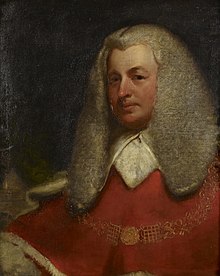The Lord Kenyon | |
|---|---|
 Lord Kenyon, by William Davison (floruit 1843) | |
| Lord Chief Justice | |
| In office 4 June 1788 – 11 April 1802 | |
| Monarch | George III |
| Preceded by | The Earl of Mansfield |
| Succeeded by | The Lord Ellenborough |
| Master of the Rolls | |
| In office 30 March 1784 – 4 June 1788 | |
| Preceded by | Sir Thomas Sewell |
| Succeeded by | Sir Richard Arden (later Lord Alvanley) |
| Attorney General | |
| In office 26 December 1783 – 31 March 1784 | |
| Prime Minister | Pitt the Younger |
| Preceded by | John Lee |
| Succeeded by | Sir Richard Arden (later Lord Alvanley) |
| In office 18 April 1782 – 2 May 1783 | |
| Preceded by | James Wallace |
| Succeeded by | James Wallace |
| Personal details | |
| Born | Lloyd Kenyon 5 October 1732 Gredington, Flintshire, Wales |
| Died | 4 April 1802 (aged 69) Bath, England |
| Nationality | British |
| Profession | Barrister |
Lloyd Kenyon, 1st Baron Kenyon, PC (5 October 1732 – 4 April 1802), was a British politician and barrister, who served as Attorney General, Master of the Rolls and Lord Chief Justice. Born to a country gentleman, he was initially educated in Hanmer before moving to Ruthin School aged 12. Rather than going to university he instead worked as a clerk to an attorney, joining the Middle Temple in 1750 and being called to the Bar in 1756.[1] Initially almost unemployed due to the lack of education and contacts which a university education would have provided, his business increased thanks to his friendships with John Dunning, who, overwhelmed with cases, allowed Kenyon to work many, and Lord Thurlow who secured for him the Chief Justiceship of Chester in 1780. He was returned as the Member of Parliament (MP) for Hindon the same year, serving repeatedly as Attorney General under William Pitt the Younger. He effectively sacrificed his political career in 1784 to challenge the ballot of Charles James Fox, and was rewarded with a baronetcy; from then on he did not speak in the House of Commons, despite remaining an MP.
On 27 March 1784, he was appointed Master of the Rolls, a job to which he dedicated himself once he ceased to act as an MP. He had previously practised in the Court of Chancery, and although unfamiliar with Roman law was highly efficient; Lord Eldon said "I am mistaken if, after I am gone, the Chancery Records do not prove that if I have decided more than any of my predecessors in the same period of time, Sir Lloyd Kenyon beat us all".[2] On 9 June 1788, Kenyon succeeded Lord Mansfield as Lord Chief Justice, and was granted a barony. Although not rated as highly as his predecessor, his work "restored the simplicity and rigor of the common law".[3] He remained Lord Chief Justice until his death in 1802.
